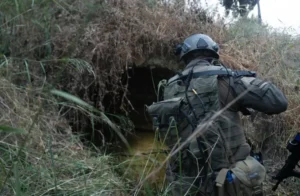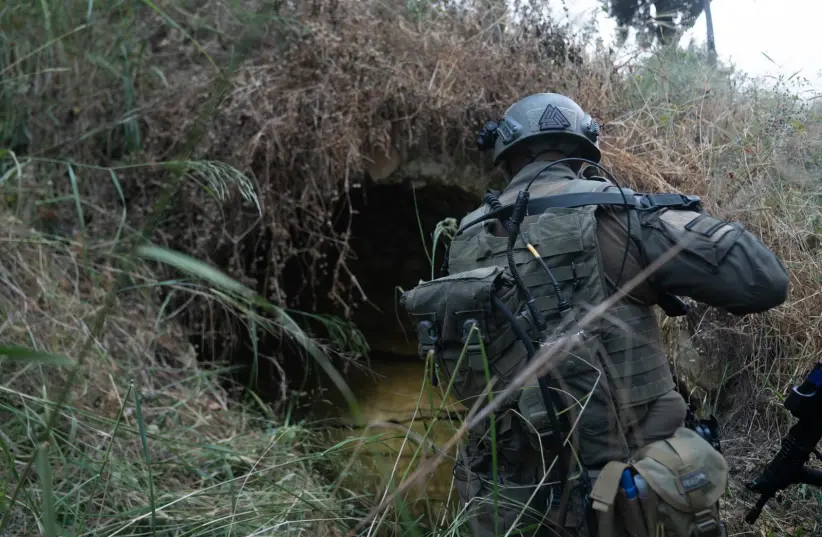Maj.Ofek Aharon and Maj.Itamar Elharar were tragically killed after being misidentified by fellow soldier in January

Despite suffering a tragedy less than six months ago, the Egoz Commando Brigade has been carrying out nightly raids in the West Bank to thwart potential terrorist attacks.
Major Ofek Aharon and Major Itamar Elharar were killed in January after another officer, “Lt. N.,” misidentified them while they were all searching for stolen equipment at the Nabi Musa training base in the Jordan Valley.
Egoz Unit Squadron Commander “Maj. I.,” whose full name can’t be disclosed, replaced Elharar following the deadly incident.
A month into the position, he commanded his troops in arrest raids in the West Bank as part of Operation Break the Wave that began following a wave of deadly terrorist attacks inside Israel that killed 20 people.
All of Egoz’s team are in “the center of the center” of the operation, Maj. I. told The Jerusalem Post. “There’s not one operation that happened that my troops didn’t take part in.”
“We have been doing operations every night for the past two and a half months. My troops are working night after night, to stop terror attacks,” he said, adding that the troops also played a part in searching for the Elad and Ariel attackers who were able to escape from the scene.
While the elite commando unit specializes in fighting in complex terrain and focuses on northern Israel, it operates at any time, in any arena and in every sector.
Though Maj. I.’s team has finished their operational activity and is now focusing on training, “because of the situation we are doing both if necessary. We are ready even when we are training. In the South, North or West Bank. We are always ready for the order to be given and we are happy to do anything that is asked of us.”
Maj. I takes over for Elharar
Two weeks after the deadly incident, Maj. I was asked if he wanted to take over from Elharar.
“It wasn’t a natural replacement, but the soldiers accepted it,”
Maj. I
“I knew that it was what I wanted, it’s a great unit,” he said. “I knew Itamar, we weren’t the best of friends but we knew each other, and so when I heard about the position, it felt like an honor to fill his shoes.”
Though troops are used to having new commanders, “it wasn’t a natural replacement, but the soldiers accepted it,” Maj. I. said.
SINCE JOINING the unit after the incident, he said he can see how they’ve learned from it.
“It doesn’t matter how good we are, we need to ask the hard questions and see how we can do better,” he said.
According to him, carrying out operational activity has been good for the troops who went back to work after the tragedy.
“I’ve been nine years in the army and it’s the most intensive period of operational activity I’ve ever taken part in,” he said.
“St.-Sgt. A.,” a combat soldier in the unit, has been with Egoz for the past two years and eight months, agreed with his squad commander, and said that carrying out operational missions “is something that we needed. We need to go out as a team together.
“Itamar was a good friend, he wasn’t only a commander, but he was a really good friend and really cared about us. I was injured at the time and he always asked me how I was feeling. He was a really special guy,” St.-Sgt. A. said.
According to him, the past few months have been “very interesting” and full of offensive operations.
“It’s been very meaningful because of the situation. I’ve felt it even regarding my family who were afraid to go out on the streets,” he said.
Meanwhile, he said, he and his fellow troops “are going out and stopping cells who are planning a terror attack. We really get to them and arrest them, and it’s a great satisfaction to know that you are helping all those who are close to you. It’s hard to explain in words.”
St.-Sgt. A., a combat soldier in Egoz joined the team after the deadly incident and joined around the same time as Maj. I.
He told the Post there was a clear connection between the missions carried out by the team and the decrease in terrorist attacks in the country.
“For sure there’s a connection. We go out every day, every night, to stop cells including those on their way to carry out an attack. We stop them in the most vulnerable places, in their beds.”
Outcomes of the recent raids
Since the beginning of Operation Break the Wave, more than 300 Palestinians have been arrested.
During the raids, dozens of Palestinians have been killed by Israeli security forces, either while committing attacks or during clashes. Several bystanders have also been killed, including a teenage girl who was returning home from studying, and Shireen Abu Akleh, an Al Jazeera journalist who was covering a raid in Jenin.
In order to bring the current wave of violence to an end, the security establishment – IDF, Shin Bet (Israel Security Agency) and Israel Police – have been focusing their sights on the northern West Bank and have increased troop presence along the Seam Line where Palestinians have illegally crossed into Israel through holes in the security fence.
The troop deployment, as well as the call-up of reserve forces, is expected to last into next year.

